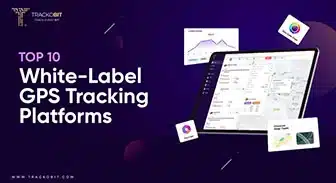-
TrackoBit
Manage commercial vehicles with the new-age Fleet Management Software
TrackoBit -
TrackoField
Streamline your scattered workforce with Field Force Management Software
TrackoField -
Features Resources
-
Blog
Carefully curated articles to update you on industrial trends. -
White Paper
Insightful papers and analysis on essential subject matters. -
Glossary
Explore an alphabetical list of relevant industry terms. -
What’s New
Get TrackoBit & TrackoField monthly updates here. -
Case Study
Explore the cases we solved with our diverse solutions. -
Comparisons
Compare platforms, features, and pricing to find your best fit.
-
About Us
Get to know TrackoBit: our team, ethos, values, and vision. -
Careers
Join the most dynamic cult of coders, creatives and changemakers. -
Tech Support
Learn about our technical support team and services in detail. -
Events
Check out the exhibitions where we left our marks and conquered. -
Contact Us
Connect with us and let us know how we can be of service.
Types of Vehicles Used in the Logistics Industry
- Author:Nandita Gupta
- Read Time:9 min
- Published:
- Last Update: August 7, 2025
Table of Contents
Toggle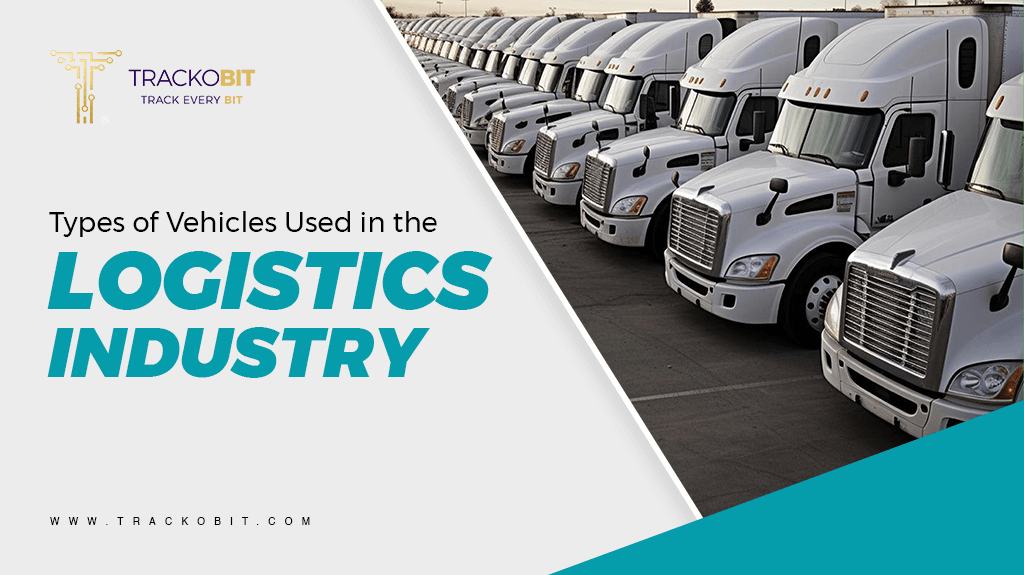
There are almost 5 types of vehicles used in the logistics industry and you are using just one kind? Explore all the types of trucks and multimodal transportation used to ensure on-time dispatch and delivery of goods.
Table of Contents
Toggle
For the logistics industry, do you know what’s more crucial than well-constructed highways or getting good luck with finding truck-specific routes? Any guesses? Well, it’s choosing the right assortment of commercial vehicles. And why wouldn’t they be, after all, they are the most crucial and primary mode for transporting goods through the road network.
For the safe and secure transfer of goods, the right selection and sizing of the fleet is very important. Otherwise, it will negatively impact your business’s bottom line and even your reputation.
“Can you imagine your goods arriving late and in poor condition just because you chose a truck that wasn’t suitable to transport heavy loads and had a poor pickup?”
Poor decisions and choices lead to just a waste of time, resources, and costs; we can’t see you keep on forgoing that.
So, here we have decided to share the top types of commercial vehicles used in the logistics industry for safe transfer through road networks. And, to ensure you don’t make bad choices, we have unearthed their versatility, range of capacities, and adaptability to various cargo types.
But before that…
Why Trucks are Commonly Used in the Logistics Process?
Fleet operators prefer using trucks in logistics as they are cost-effective, quite flexible to operate, and can access various locations at frequent intervals. Most of all, they are suitable for handling diverse cargo material and managing door-to-door services. It’s a go-to choice for covering short or long-haul distances across different states.
Read Blog – Should You Buy or Lease Your Fleet Trucks?
Types of Trucks Used for Supply Chain and Logistics
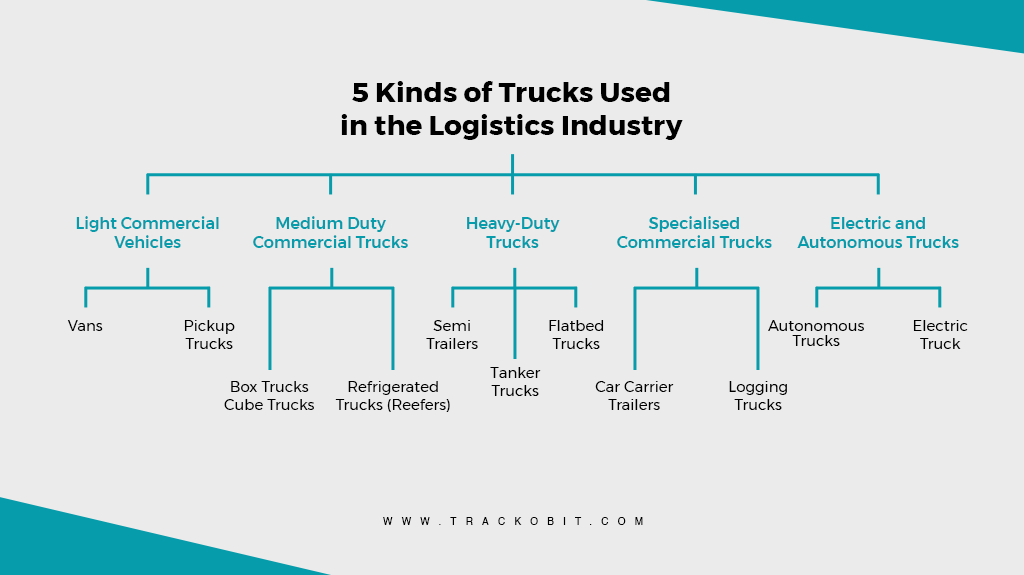
1. Light Commercial Vehicles (LCVs)
Light commercial vehicles or LCVs are types of commercial vehicles with gross vehicle weight (DGVW) or maximum authorised mass (MAM) equal to or less than 3.5 tonnes. These types of trucks in the logistics industry include vans and pickup trucks that are primarily used for transporting goods, delivering packages, or providing last-mile delivery services.
LCV includes:
a) Vans
Vans are economical to use for transporting smaller or frequent loads in last-mile delivery or fulfilling urban logistics needs. Ford Transit and Mercedes-Benz Sprinter are popular commercial van models known for their lower fuel consumption, easy maneuverability in congested and tight spaces, and overall cost-effectiveness in covering short distances.
b) Pickup Trucks
These commercial trucks are commonly preferred for small-scale logistics operations, typically in semi-rural or rural areas. Toyota Hilux and Ford F-150 are popular pickups within the trucking industry known for their great versatility in handling a variety of cargo types and loads. And the best part of such vehicles is their amazing off-road capability that ensures damage-free transit.
2. Medium Duty Commercial Trucks
Medium-duty commercial trucks fall under the trucks’ 6-7 class types of vehicles. Their gross weight ranges from 19,501 to 33,000 lbs. The following are a few types of trucks suitable for light to medium duty applications.
a) Box Trucks/Cube Trucks
Box or cube trucks are ideal for transporting or moving goods such as retail inventory, furniture, and appliances across distinct regions. Such vehicles often have enclosed cargo areas that protect goods from harsh weather conditions. On the plus side, loading, unloading, and handling goods from such vehicles is quite easy.
Isuzu N-Series and Hino 300 are a few of the popular box trucks that fleet owners confidently prefer using in the middle mile to last-mile delivery.
b) Refrigerated Trucks (Reefers)
The transportation of perishable or time-sensitive goods like food, pharmaceuticals, and flowers requires transfer through special refrigerated trucks. Such specialised commercial trucks have an in-built reefer whose temperature can be easily controlled via cold chain monitoring solutions to ensure products’ efficacy and quality control.
Thermo King and Carrier Transicold are a few popular models dominating the market under the segment of refrigerated trucks because of their robust build and features.
3. Heavy-Duty Trucks
a) Semi-Trailers
Semi-trailers are heavy-duty trucks that are primarily used for transferring large volumes of freight across long-haul routes.
These trucks are highly advantageous for fleet managers who require high payload capacity, and flexibility in detaching trailers. Freightliner Cascadia and Volvo VNL are a few popular models of semi-trailers used for interstate and international logistics.
b) Flatbed Trucks
Flatbed trucks are heavy-duty trucks used for hauling irregularly shaped or oversized loads like construction materials, machinery, or any large equipment.
These models are highly opted for because they are easy to load and unload goods and have great versatility in handling a variety of cargo.
Kenworth T880 and Peterbilt 389 are popular types of trucks that are the go-to choice for fleet operators in the trucking industry.
c) Tanker Trucks
Tanker commercial trucks transport liquids like fuel, chemicals, and gasses. These vehicles are advantageous because they are durable and built to safely transfer explosive substances.
Mack Anthem and Volvo VNX are a few popular tanker trucks that are often used to transfer dangerous liquids and gasses. These two types of trucks are very in-demand models within the trucking industry.
4. Specialised Commercial Trucks
a) Dump Trucks
Logistics businesses commonly use dump trucks to transfer construction and mining materials such as sand, gravel, and demolition waste.
These trucks are suitable for such sites because of their impressive Hydraulic lifting mechanism, which makes it easy to unload items at dump sites. The best thing is that they can continue to veer through tough terrain even while carrying heavy loads.
Caterpillar 797F and Komatsu HD785 are a few popular models in the trucking industry dominating the category of dump trucks.
b) Car Carrier Trailers
Car carriers transport multiple vehicles across long distances. Because of their robust design and construction, they are highly preferred for efficient loading and securing.
Volvo FM Car Transporter and Scania P-series are a few popular models that dominate this segment.
c) Logging Trucks
Logging trucks are designed to transport logs straight from forests to sawmills. These trucks are built with reinforced chassis and suspensions that make them suitable for lifting, loading, and transporting heavy loads with ease. This allows them to operate well across off-road conditions spot on.
Western Star 4900 and Kenworth T800 are a few popular models in this segment.
5. Electric and Autonomous Trucks
Electric commercial trucks are the present, and autonomous trucks will be the undeniable future of our economy.
a) Electric Trucks
Upon realizing the potential of electric fleets, fleet businesses are now increasingly adding electric trucks to make deliveries across urban and short-haul routes to lower their carbon footprint.
Electric trucks are one of the best modes because they have low operational costs, and quiet, noise-proof operation. Their upkeep and maintenance are less costly and less frequent. Tesla Semi and Rivian R1T are a few popular models in the electric trucking industry.
b) Autonomous Trucks
Autonomous trucks that drive themselves from pickup to delivery point without any human intervention are the future that will uplift commercial transportation in positive ways. These trucks are still in the development and testing stages, but once they are fully in the market, they would be best suited to handle both long-haul and last-mile deliveries.
These revolutionary truck types hold great potential for reducing labor costs, enhancing on-road safety, and increasing efficiency in transporting goods on time.
Embark Trucks and TuSimple are a few popular autonomous commercial trucks that are dominating the market right now.
Other Commercial Vehicles for Logistics (Across Multi-Modal Journey)
In commercial logistics and supply chain processes, freight operators also opt for other modes of transportation (than the above ones) when the sourcing and delivering destinations are placed at vast, ocean apart distances. In such a scenario, they prefer circulating the freight with the following vehicles or modes of transport or types of vehicles.
1. For Rail Transport
a) Freight Trains
This model efficiently transports bulk commodities like agricultural products, coal, minerals, and more. Freight trains are advantageous as they have high volume capacity, a lower carbon footprint, and are less cost-effective for long distances.
b) Intermodal Trains
Intermodal trains contain shipping containers and truck trailers that can be easily transferred between ships, trucks, and trains. These vehicles are advantageous as they are highly flexible, have lower handling costs, and promote enhanced cargo security.
This model is suitable for transferring retail products, agricultural goods such as grains, and industrial items like auto parts.
2. For Air Transport
a) Cargo Planes
Cargo planes are special freighter aircraft or specially converted passenger planes that are used for transferring high-value, time-sensitive, or perishable goods. This model is highly advantageous when the delivery is required to be done on priority and at speed across global locations with fewer handling complexities.
b) Express Parcel Services
This involves smaller aircraft that are especially used by courier companies for overnight or express documents and parcel delivery. This model is highly suitable for rapid, safe, and reliable delivery times.
3. For Maritime Transport
a) Container Ships
Container ships are used to transport containers filled with a variety of goods in great volume. Their high capacity, and efficiency for commuting between long-distanced ports while maintaining economies of scale make them a stellar choice for manufacturers and industrialists.
b) Bulk carriers
They are designed to transport unpackaged bulk cargo such as ore, coal, cement, and grains due to their tough built to handle any heavy to low-value commodities,
c) Roll-on/Roll-off (Ro-Ro) Ships
- Usage: Carrying wheeled cargo like cars, trucks, and trailers.
- Advantages: Efficient loading and unloading, ideal for vehicle transport.
Parting Words on Types of Vehicles!
The logistics industry depends on diverse types of vehicles, mainly trucks to fulfill their transportation needs. From the nimble light commercial vehicles suited for urban deliveries to the massive tractor-trailers suitable for inter-city travel – each type plays a critical role in delivering an important consignment safely and on time.
Every truck is different in type, size, and make and thus, isn’t ideal for meeting every logistics needs. It’s best to analyze each type, review its features, and then choose the suitable one.
Once you are done making a choice, don’t forget to leverage TrackoBit’s fleet management software to meet your bottom lines and save on operational costs.
Other Trending Reads
- How to Track Vehicles Without Tracking Devices? The Cost-Effective Way
- What is a Commercial GPS Tracker? How Do They Work?
- How Do Front and Rear Dash Cams Work?
FAQs on Types of Vehicles in the Logistics Industry
-
What are the different types of vehicles in logistics?
In the logistics industry, distinguished types of transportation modes such as rail, maritime, and air, as well as multimodal and intermodal connections are most preferred.
-
What is the common mode of transport in the logistics industry?
Road networks are the preferred mode of transportation for logistics businesses. However, depending upon various requirements like distance, timeline, and other factors, such businesses also prefer to ship consignments and goods via air, water, and railway modes.
Nandita is the Team Lead for Content Marketing at TrackoBit, bringing over a decade of experience in B2B, B2C, and IoT sectors. She has a proven track record of helping Read More
Related Blogs
-
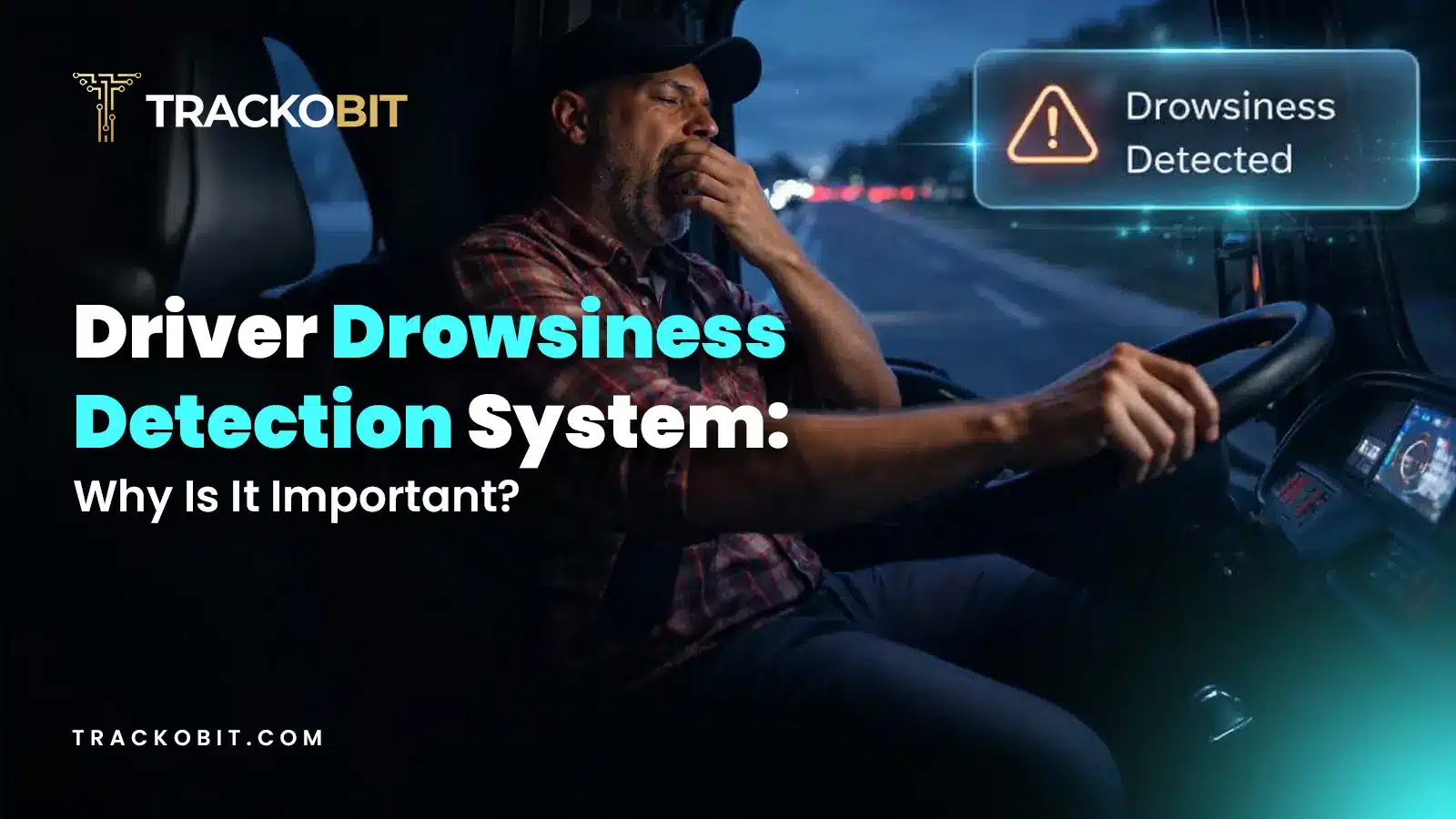
Why is Driver Drowsiness Detection System Important for Fleet Management?
Shemanti Ghosh February 4, 2026A driver drowsiness detection system is critical for fleet management. It helps prevent fatigue-related accidents and reduces operational risks through…
-
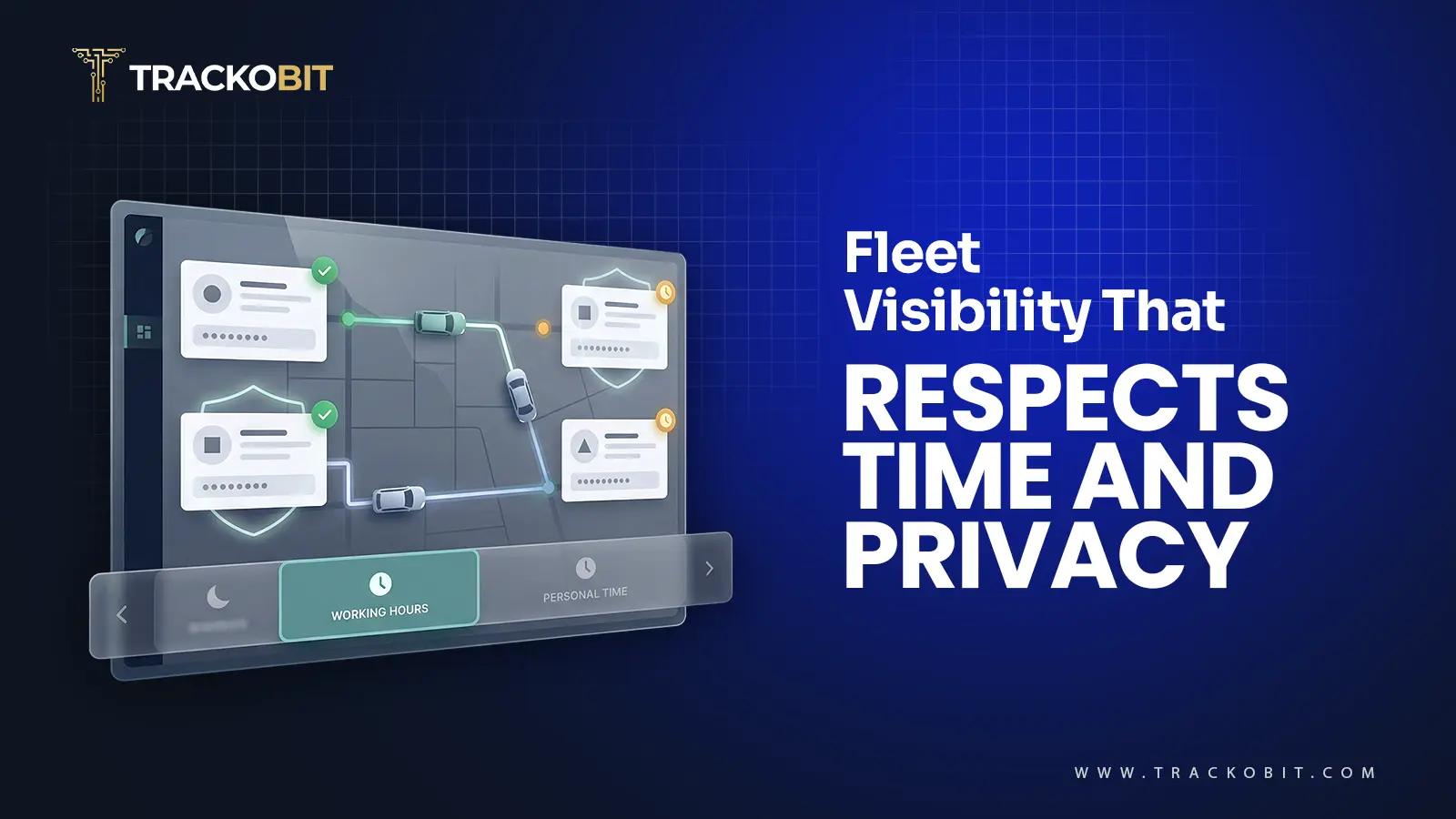
When Tracking Needs a Clock: Rethinking Fleet Visibility
Tithi Agarwal December 24, 2025Read on to understand why fleet tracking works better when it follows working hours. Because visibility should support operations, not…
-

What Makes TrackoBit’s Video Telematics Software Truly Next-Gen?
Shemanti Ghosh December 17, 2025TrackoBit’s video telematics software blends smart video intelligence with full server control. The result? Superior fleet reliability and safety.
-
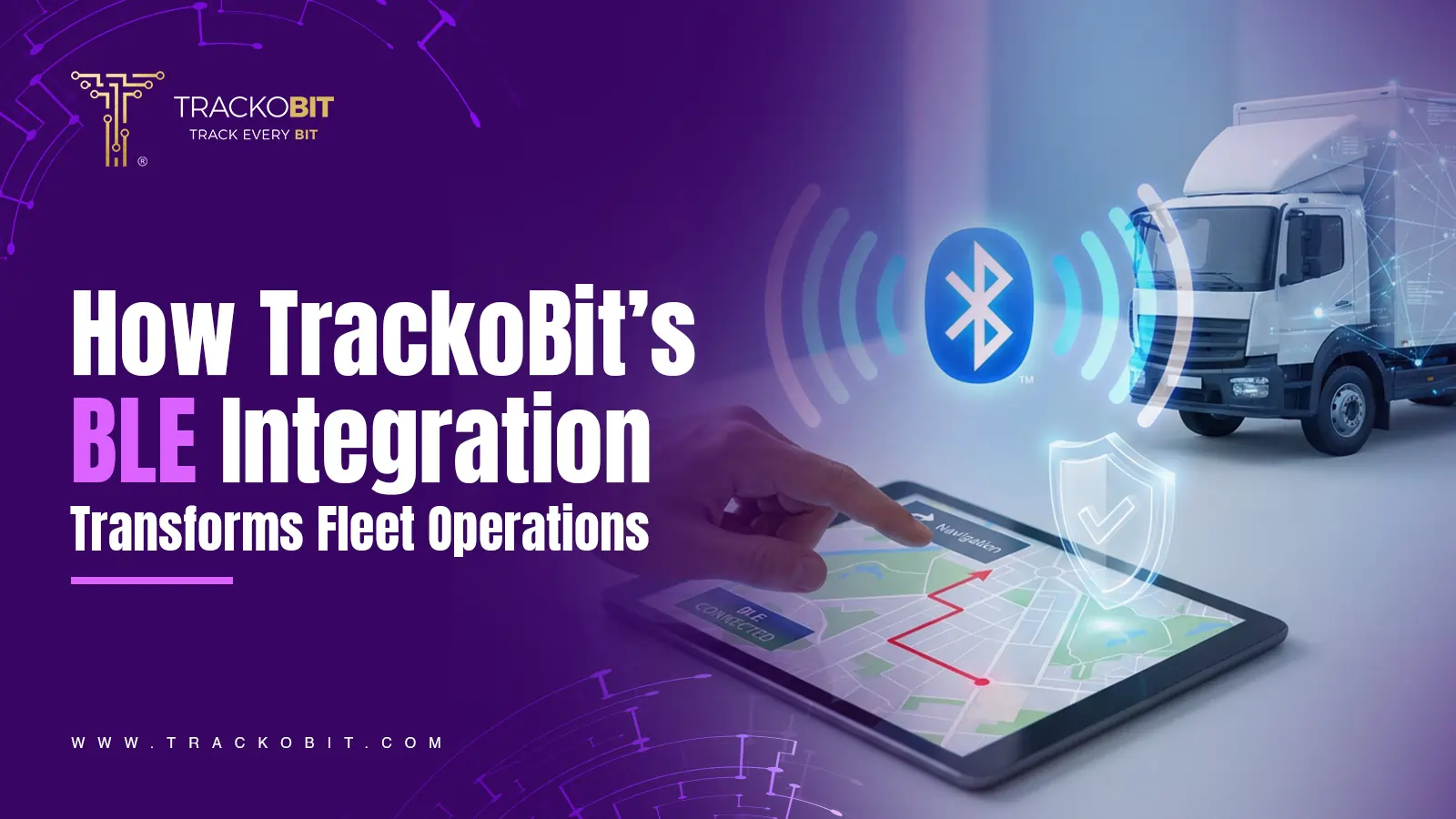
Plug, Pair, Perform TrackoBit Introduces BLE Sensor Integration
Tithi Agarwal November 26, 2025TrackoBit’s BLE Sensor Integration enables wireless, real-time monitoring with faster installs and accurate insights. It improves fleet efficiency, visibility, and…

Subscribe for weekly tips to optimize your fleet’s potential!
Your inbox awaits a welcome email. Stay tuned for the latest blog updates & expert insights.
"While you're here, dive into some more reads or grab quick bites from our social platforms!"Stay Updated on tech, telematics and mobility. Don't miss out on the latest in the industry.
We use cookies to enhance and personalize your browsing experience. By continuing to use our website, you agree to our Privacy Policy.



































